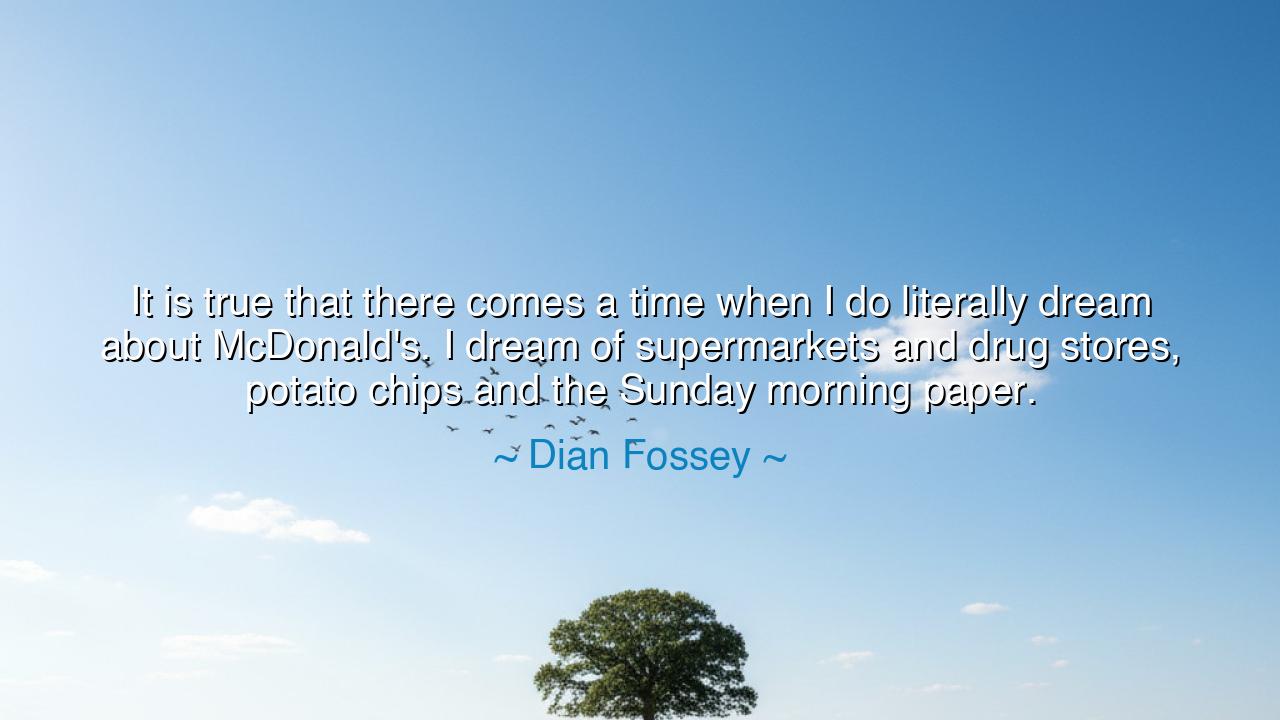
It is true that there comes a time when I do literally dream
It is true that there comes a time when I do literally dream about McDonald's. I dream of supermarkets and drug stores, potato chips and the Sunday morning paper.






Hear the voice of Dian Fossey, the guardian of the gorillas, who endured solitude in the high forests of Rwanda, and who confessed: “It is true that there comes a time when I do literally dream about McDonald’s. I dream of supermarkets and drug stores, potato chips and the Sunday morning paper.” In this reflection, lighthearted in tone yet heavy in meaning, lies the paradox of devotion: that when one gives their life wholly to a cause, the comforts of ordinary living—once dismissed as trivial—return as visions of longing. Fossey’s words reveal that even in the noblest labor, the human soul hungers not only for greatness, but for the simple rhythms of home.
The ancients knew this truth well. The soldier at the frontier, though hardened by duty, dreamed of bread baked fresh by his mother. The exile, cast out for conscience or crime, longed not for glory but for the familiar scent of his native soil. Even Odysseus, who wandered ten years after the Trojan War, did not dream of palaces or treasures, but of his hearth, his bed, his faithful Penelope. Fossey, immersed in her sacred work among gorillas, found herself dreaming not of accolades or discoveries, but of potato chips and the Sunday morning paper—symbols of the ordinary life she had set aside.
Her mention of McDonald’s and supermarkets is more than humor; it is a recognition of the quiet power of routine. These places, so common in the modern world, represent choice, abundance, and familiarity. To one living in isolation, sustained by sparse supplies and constant toil, the thought of walking through a brightly lit aisle or ordering food at leisure becomes a dream of Eden. It is not gluttony but longing for connection, for the rhythm of a world where life is not only survival, but also comfort.
Yet her words carry also a heroic undertone. For what she dreamed of, she willingly sacrificed. Fossey could have lived among the ordinary blessings of the Sunday morning paper, but she chose instead the rough roads of conservation, the hardship of the mountains, the company of gorillas instead of men. Her longing did not undo her mission—it illuminated its cost. In this, her confession teaches us that all great callings demand trade-offs, and even the strongest spirit must wrestle with the ache of what is left behind.
Consider the story of Ernest Shackleton, who led his men into the frozen wastelands of Antarctica. When food ran low, his sailors dreamed vividly of banquets, of steaming stews and fresh bread. They wrote menus in the snow, their imaginations clinging to the ordinary meals of home. These dreams did not weaken them; they sustained them, reminding them of the sweetness that awaited survival. So too did Fossey’s visions of supermarkets and McDonald’s serve as a thread binding her wilderness struggle to the world she had left behind.
The lesson, then, is clear: never despise the ordinary. The routines of daily life—the paper, the store, the meal—are not trivialities, but treasures hidden in plain sight. Only when deprived of them do we recognize their weight, their grounding power. Fossey’s longing is a call to gratitude, a reminder that what seems mundane is often the foundation of joy.
Practically, then, let each of us learn to honor our Sunday mornings, our meals, our small comforts. See them not as distractions, but as gifts. And when life calls you to sacrifice—as it will in times of labor, hardship, or pursuit of a greater cause—carry the memory of these simple blessings with you. They will sustain you as surely as bread sustains the body.
And so, O listener, engrave this wisdom in your heart: that even the greatest among us, who leave comfort behind to pursue destiny, still dream of the ordinary. For in the ordinary lies the soul of humanity. Cherish it now, lest one day you too find yourself in some wilderness, dreaming of the sweetness of what once seemed small.






AAdministratorAdministrator
Welcome, honored guests. Please leave a comment, we will respond soon